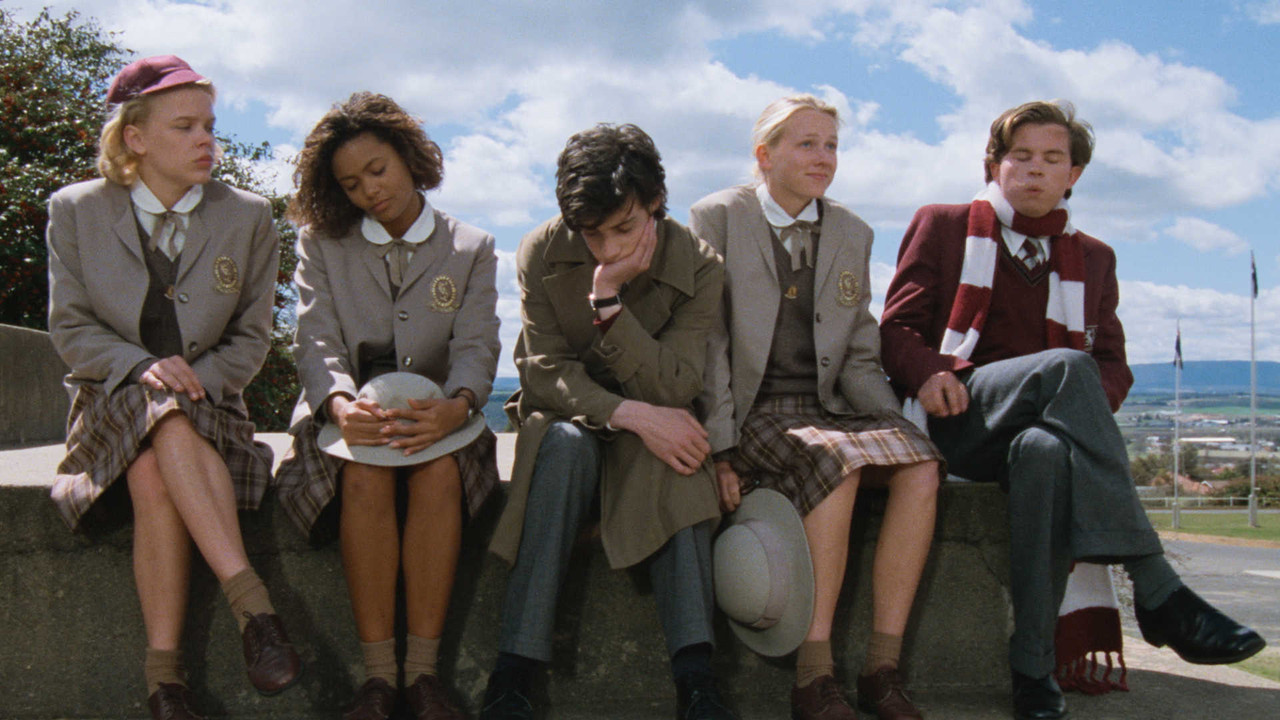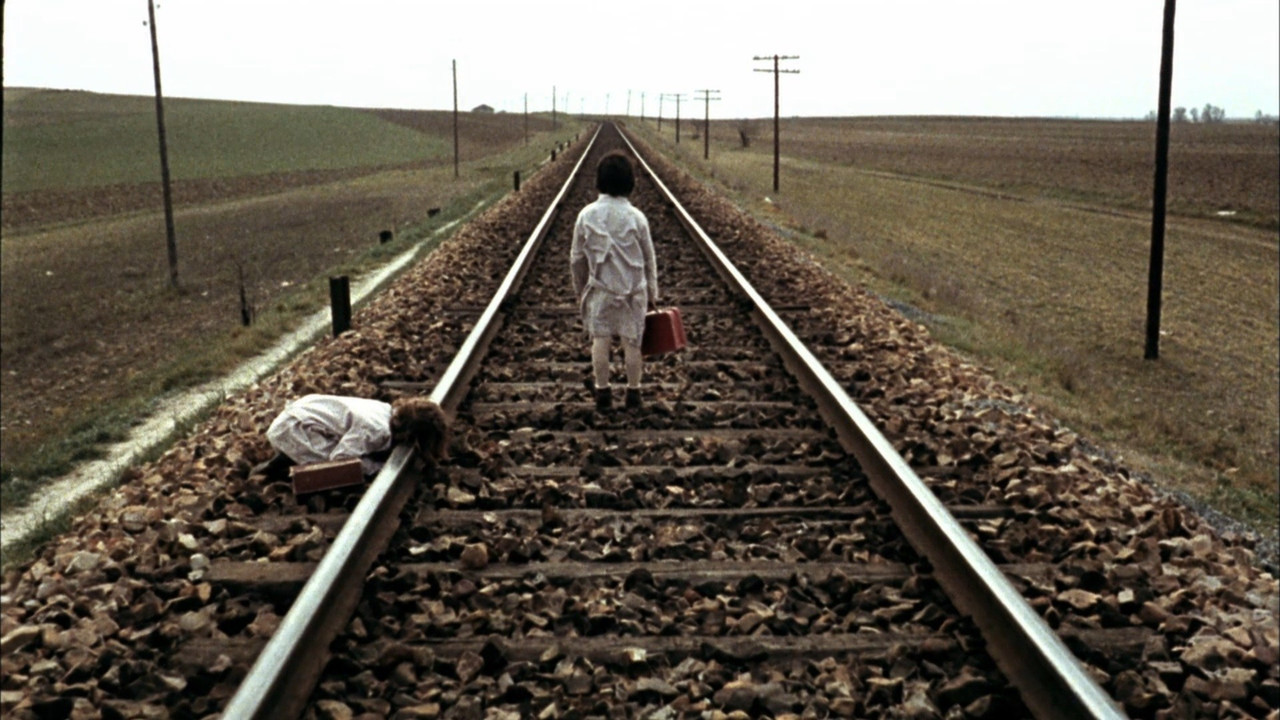Flirting
Dir: John Duigan
I'm a hoarder of films. Across Blu Ray, DVD and VHS collections I own perhaps 4000 different movies, many of which I have not yet got around to watching, the thing is, I know they're available when I do want to watch them. The copy of Flirting I watched for this series of reviews is an old rental VHS that I picked up in a charity shop, probably close to 15 years ago, but have never quite got around to watching until now.
Had I watched this tape when I first bought it I would have been about the same age as Noah Taylor's character, and I'm sure I'd have seen quite a lot of myself in the shy, somewhat nerdy, boarding school pupil that he plays (though I, to my enduring disappointment, did not get to make out with Thandie Newton), but I wonder if I'd have liked the film as much as I did watching it today.
John Duigan's autobiographical film is a beautifully observed piece of work about two teenagers from neighbouring boarding schools (Taylor and Newton) falling for each other when the schools get together to put on their annual play. The two aren't supposed to leave their respective schools, but they find regular opportunities to see each other and their tentative romance is drawn in realistic and engaging detail.
Taylor, as Duigan's alter ego Danny Embling (a role he also played in the earlier The Year My Voice Broke), gives an excellent performance. He's always been rather awkward and gawky looking, but he has an offbeat charm that you can see Newton's Thandiwe being charmed by and the voiceover that Duigan gives him reveals much about the character's inner life and thoughts, and is delivered beautifully by Taylor. That voiceover leads to many of the film's best moments, especially in one scene in which Danny and Thandiwe are sitting with some other kids and, in the voiceover, Danny explains that he was looking at her legs, and how the lines made by the elastic in her socks confirmed for him that she was real. It's a romantic idea, perhaps the more so for the fact that he never expresses it to Thandiwe, but it also acknowledges that, hey, Danny's 16, of course he's looking at this girl's legs.
Thandie Newton is similarly excellent and brilliantly cast, in her first film, as Thandiwe. Though Newton's race and the character's Ugandan heritage is a factor in the film it's nice that Duigan doesn't lean too hard on the racial aspect as an obstacle to Danny and Thandiwe being together. I did wonder, from time to time, whether an interracial relationship would have been more of an issue in the Australia of the late 50's than the film makes it, but focusing on that would probably have lurched what is a distinctly un movie-like movie into either cliché, preaching or both. Instead the film strikes a fine balance; making it clear that certain people don't approve, but largely adopting Danny and Thandiwe's lack of interest in this issue.
The supporting cast is also strong, with two particularly notable names in the shape of Nicole Kidman and, in a very small part, Naomi Watts. Kidman's presence is played up in the publicity materials (especially the scene where she and two other girls dance in their underwear) but she has relatively few scenes as the queen bee of the girls boarding school. Still, Kidman gets to develop as the film goes on, going from being an obstacle in Danny and Thandiwe's way to helping them out.
Flirting's dramas are small, but the film's intimacy and its clearly personal nature are its greatest strengths. It's a charming film that captures a wider experience through a personal viewpoint.
★★★★
The Spirit of the Beehive
Dir: Victor Erice
I suppose this is cheating a little because The Spirit of the Beehive is not strictly a coming of age film, but more a film about childhood, still it's not far off, so I'm including it in this series.
Victor Erice's remarkable film is set in Spain in 1940. It begins with a travelling cinema bringing Frankenstein to a remote town, seven year old Ana (Ana Torrent) sees it with her older sister Isabel (Isabel Tellería) and is entranced by the film, especially the scene in which the monster accidentally drowns the little girl. Drawn by the story of the monster, Ana escapes her home life into a fantasy world which becomes rather too real when Ana discovers a fugitive from the civil war living in a nearby barn where she and her sister think the monster lives.
I think I will have to watch The Spirit of the Beehive several more times before I truly get a handle on what it is about, especially at a metaphorical level. On a first glance though it struck me as a film about a fractured family; the mother and father barely speak and interact with their young children only occasionally (Mother brushing their hair, Father taking them mushroom picking). Erice draws visual parallels, underscored by the father's dialogue, between the beehives the family keeps and their home, the windows of which all have a honeycomb pattern, but rather than depict a close community in the home Erice never shows the entire family together - even when they are all eating dinner together - in a single frame. I got the feeling that the girls' fantasy world, as well as being the sort of play typical of their childish innocence, was an escape route from having to acknowledge this fractured home life.
While the film is sometimes elliptical and seems to tread further into fantasy the longer it goes on, it is grounded by some exceptional performances, especially from seven year old Ana Torrent. Torrent's huge eyes, open face and apparent curiosity about everything around her leap off the screen. She also has a remarkable ability, which many adult actors never find, to allow us to see the thought process behind what her character is doing. This is most obvious in the scene where she finds Isabel lying on the floor, apparently at least badly hurt and unconscious from a fall. You can see the stages as she processes the information, tries to wake her sister, tires to see if she's hurt or is playing a game. The same thing happens in scenes with the fugitive; her childlike understanding clearly trying to reconcile fact and fantasy. It's an astonishing performance, one of the best ever by someone so young.
The other performances also strike a tone of simple reality, further helping the blend of reality and fantasy, and as good as Torrent is one shouldn't allow that to take away from Isabel Tellería's performance, which is perhaps equally strong. Tellería also has the one true coming of age moment in the film, when Isabel, looking at herself in the mirror, bites her finger and uses the blood to approximate lipstick.
As enchanting as The Spirit of the Beehive is at a story and acting level, Victor Erice's images are just as compelling and beautiful. Frequent close ups allow the actors, especially Torrent, to give incredibly detailed silent performances (dialogue is generally quite sparse), and when the film pulls back to observe the characters environments it has a rugged beauty that calls to mind early Malick (this film was made the same year as Badlands). The setting of the house where the sisters believe the monster lives is especially haunting in its sparse, broken down, beauty.
Most films are pretty simple. You get served everything they have to offer on a first viewing, The Spirit of the Beehive doesn't seem to be like that. I suspect, as is the case with many of the films I like best, I will be returning to this one in the future and finding different things in it: new ideas, new meanings, new moments to love. I can't wait.
★★★★★
★★★★★



No comments:
Post a Comment